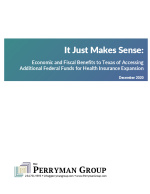It Just Makes Sense
Economic and Fiscal Benefits to Texas of Accessing Additional Federal Funds for Health Insurance Expansion
Published on December 14, 2020

Texas is one of only 12 states that have not yet chosen to expand health insurance coverage to low-income adults using the financially attractive mechanism created with passage of the Affordable Care Act (ACA) in 2010. In addition to enhancing the health and wellbeing of individuals directly affected, expanding health insurance coverage involves substantial economic and fiscal benefits.
With more Texans covered by health insurance, health-related spending would increase, generating additional business activity in communities across the state and throughout the economy. The level of uncompensated care could also be expected to fall, freeing up hospital and local taxing entity resources to be used for other critical priorities. In addition, increased coverage assists more people in obtaining the care that they need, improving morbidity and mortality outcomes and, in turn, increasing productivity. Higher productivity associated with improved health outcomes leads to additional economic activity and other benefits, some of which occur over an extended period.
If Texas implements a program to access federal matching funds for health insurance expansion in 2021, The Perryman Group estimates that the economic effects for the 2022-23 biennium would include gains of $45.3 billion in gross product, $29.4 billion in personal income, and almost 461,700 job-years of employment over the biennium, including multiplier effects. This economic activity generates tax receipts. The Perryman Group estimates that the net total dynamic fiscal benefits during the 2022-23 biennium would include $2.5 billion to the State and nearly $2.0 billion to local government entities across Texas. For every $1 of non-federal funds invested, $1.95 is returned to the State in dynamic tax revenue. Millions of Texans do not have health insurance. Most cannot afford private insurance and are unable to obtain basic or preventive health care. Texas could alleviate a substantial portion of this problem by expanding health insurance coverage using available federal funds and reap notable economic and fiscal gains in the process. It just makes sense!
This research was funded by the Episcopal Health Foundation and St. David's Foundation.
For more information, please refer to the following resources:
- Report (PDF)
- Appendices (PDF)
- Full Report and Appendices (PDF)
- Tags: expansion, healthcare, Texas, insurance